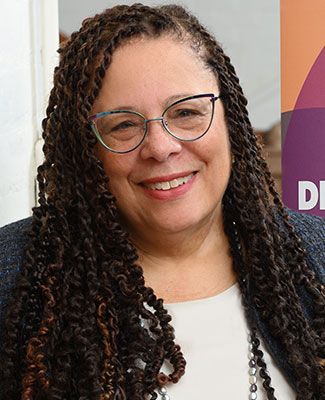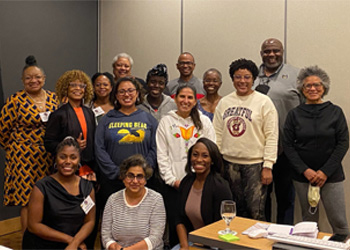Helping a great program grow
“I believe in the DRN. It is the best job I’ve ever had, and I love, love, love working with our talented faculty, and I love when we can see that our support makes a difference.”

Helping a great program grow
“I believe in the DRN. It is the best job I’ve ever had, and I love, love, love working with our talented faculty, and I love when we can see that our support makes a difference.”
December 4, 2023Deborah Johnson is the inaugural director of MSU’s Diversity Research Network (DRN), and when it comes to being a champion for the program’s mission, she absolutely walks the walk.
The program is one of the CrowdPower and other online fundraising projects being supported by Spartans during MSU’s annual Give Green Day online fundraising campaign taking place on Tuesday, March 12, 2024.
“We support diversity research scholars and diverse scholars,” Johnson says. The network is inclusive of faculty of color, international faculty of color, and faculty who belong to a wide range of underrepresented communities and marginalized social identities.
As an African American scholar and a member of the very community her program serves, she has a deep primary knowledge and understanding of its importance—this, in turn, has inspired her to also become a donor to the program, contributing critical funding that helps the network she serves to grow and flourish. And flourish, it has.
Back in 2013, the Office for Institutional Diversity and Inclusion (formerly the Office for Inclusion and Intercultural Inclusion) collaborated with Isis Settles, who at the time was a professor in the Department of Psychology, to conduct a qualitative study about the workplace experiences of underrepresented minority tenure system faculty. The study revealed that often, faculty of color and diversity scholars experience racial, ethnic, gender or intersecting bias, otherness, or isolation in their departments or in their fields at large—especially at an institution the size of MSU.
As such, the DRN was born and built around five major pillars: scholarship, support, visibility, student engagement, and community engagement—all with the larger goal of linking diverse scholars, particularly those underrepresented, and diversity scholars across disciplines and across the university, elevating the visibility of their work, and creating an environment that is supportive of their recruitment, retention, and advancement in their careers.
And, while it costs nothing for Deborah Johnson to support a colleague in the DRN by telling them, “At the DRN we see you, and we’ve got your back,” the value of donor support cannot be overstated.
We were able to launch an awards program and provide small bits of funding to generate new work or help newer faculty initiate and build their research and scholarly programs. Over the past six years, we’ve had 65 scholars who have been launch award recipients.
Awardees have used their launch grant funding to complete work that enables them to go for a more substantial grant. For those in the humanities and the arts it has been used to cover production costs to get a film or performance project across the finish line. Others have used it to develop data or other materials for publication. All of these things, Johnson says, have resulted in larger awards, fellowships, prestigious recognitions and other opportunities for the awardees. Bottom line: seed money—even just a little bit—helps.
But what if the DRN could offer more?
That’s where additional donor support can help in a big way.
“It’s not just award money,” Johnson says. “We also offer what we call writing spaces and writing retreats, which help us support faculty in their scholarship and build intricate networks and collaboratives.”

These events enable faculty members to learn more about each other’s work, but also have an opportunity to get away from their offices, free themselves from distractions, and dig into their own work. Funding helps cover the costs—of space rental, of meals, and of how much individual faculty members have to pay out of pocket to participate. It enables the DRN to plan more events and training. It enables them to increase their staffing capacity.
And—much the same way a little bit of funding often helps a researcher obtain much bigger funding—the ability to gradually increase the DRN’s capacity for a broader impact across campus with programming and infrastructure for scholars will only help the DRN grow and better serve their members.
Really, the potential of this vehicle is limitless, and Deborah takes immense pride in reaching for it.
“I believe in the DRN. It is the best job I’ve ever had, and I love, love, love working with our talented faculty, and I love when we can see that our support makes a difference.”
LEARN MORE about supporting the Diversity Research Network by visiting their CrowdPower page or by contacting Associate Director of Development Danielle Matlick at matlickd@msu.edu or by calling (517) 353-2116.
Author: Devon Barrett, '11



